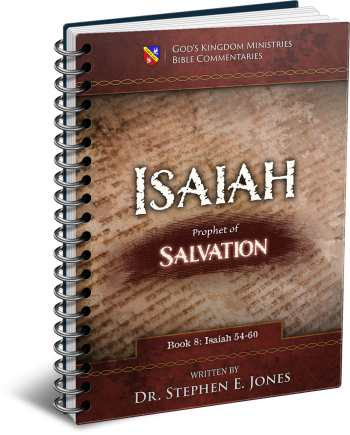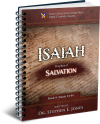Latest Posts
View the latest posts in an easy-to-read list format, with filtering options.

Isaiah is the prophet of Salvation. He is also known as the truly "Universalist" prophet, by which is meant that He makes it clear that salvation is extended equally to all nations and not just to Israel. He lived to see the fall of Israel and the deportation of the Israelites to Assyria, and he prophesied of their "return" to God (through repentance). He is truly a "major prophet" whose prophecies greatly influenced the Apostle Paul in the New Testament.
Category - Bible Commentaries

In Isaiah 54 God speaks directly to Sarah and her spiritual children, telling her that she will have more children than Hagar. Though the prophet does not directly name either woman, the Apostle Paul identifies them clearly in Gal. 4:27. Therefore, we see that the prophet was giving comfort to Sarah, who was the personification of the New Covenant, as well as her spiritual children who have faith in Christ, the Mediator of that New Covenant.
God’s marriage to Israel at Mount Sinai was an Old Covenant marriage. The children of that union were fleshly, because their mother was Hagar the Egyptian. Paul says in Gal. 4:25, “Now this Hagar is Mount Sinai in Arabia.” Israel’s exile to Assyria fulfilled nationally God’s command to Abraham: “Cast out the bondwoman and her son.” Fleshly children cannot be inheritors of the Kingdom and were cast out.
From that point on, the Old Covenant began to be “obsolete and growing old” (Heb. 8:13), and the only way to be married (or remarried) to God was through New Covenant faith.
Isaiah 54:4, 5 says,
4 “Fear not, for you will not be put to shame; and do not feel humiliated, for you will not be disgraced; but you will forget the shame of your youth, and the reproach of your widowhood you will remember no more. 5 For your husband is your Maker; whose name is the Lord of hosts; and your Redeemer is the Holy One of Israel, who is called the God of all the earth.”
God’s first marriage (to Hagar) ended in divorce, and she was “cast out” of the house, according to the law in Deut. 24:1 (KJV). Among the exiles were true believers, for God always reserves a remnant of grace to carry the light of truth to those who walk in darkness. This remnant of grace was comprised of those who had Abrahamic faith in the promise of God.
Whether or not they fully understood the quality of their own faith, it was based on the New Covenant. In fact, no one has ever been saved by the Old Covenant. The remnant of grace living in Old Covenant times was justified by faith in the promise of God, which preceded the Old Covenant. Hence, Abraham believed God’s promise and it was counted to him as righteousness (Rom. 4:21, 22). Paul makes it clear that New Covenant believers both before and after the cross are part of the remnant of grace. Rom. 11:4, 5 says,
4 But what is the divine response to him? “I have kept for Myself seven thousand men who have not bowed the knee to Baal.” 5 In the same way then, there has also come to be at the present time a remnant according to God’s gracious choice.
So in Isaiah 54:4, 5, God was speaking specifically to this New Covenant remnant as if He were talking to Sarah and her New Covenant children. Though many of them had been exiled, and more were to be exiled from Judah in the years ahead, these remained “married” to God, because their marital status was not based upon the Old Covenant but upon the New.
Thus, when Christ died on the cross, this remnant of grace became a widow, whose “Husband” and “Maker” had died. Her Husband’s death had been described in Isaiah 53. However, this remnant was not left desolate, for she was being redeemed from the house of bondage by the same pattern that God had redeemed Israel from Egypt. The main difference is that under Moses, Israel was redeemed and then married as a bondwoman whose spiritual mother was Egypt. Under Christ, Israel was redeemed and married as a free woman.
The Old Covenant, based on man’s “free will” decision to follow and obey God, could only end in disaster, because “all have sinned” (Rom. 3:23). It was in the divine plan that this Old Covenant marriage should end in divorce, for in this way God proved the futility of men’s works and the will of man. For this reason, the entire body of people—including the remnant of grace—had to experience the hardship of exile. But comfort is given to the remnant.
Isaiah 54:6-8 says,
6 “For the Lord has called you, like a wife forsaken and grieved in spirit, even like a wife of one’s youth when she is rejected,” says your God. 7 “For a brief moment I forsook you, but with great compassion I will gather you. 8 In an outburst of anger I hid My face from you for a moment, but with everlasting lovingkindness I will have compassion on you,” says the Lord your Redeemer.
Israel as a whole was comprised partly of idolaters and partly of Old Covenant believers. The divorce was necessary in order to establish a better marriage covenant—one that would succeed. The promise of God was that the fleshly Israelites (children of Hagar) would be redeemed and would change mothers, so that they might truly be the seed of Abraham.
The promise of God ensures that this will happen, because it is not based on the will of man but of God (John 1:13). In other words, God has promised to turn the hearts of all men so that they can be saved. That is the meaning of the promise that God was to bless all nations through the seed of Abraham. Acts 3:25, 26 says,
25 “It is you who are the sons of the prophets and of the covenant which God made with your fathers, saying to Abraham, ‘And in your seed all the families of the earth will be blessed.’ 26 For you first, God raised up His Servant and sent Him to bless you by turning every one of you from your wicked ways.”
God promised to save “every one of you,” not by putting away the law or by setting aside divine judgment, but by turning their hearts, causing them to repent of their “wicked ways,” and instilling New Covenant faith in their hearts. Since most of them failed to repent during their lifetime on earth, it is plain that they will bow their knees and swear allegiance to Christ when they are raised from the dead and summoned to the Great White Throne.
At the present time, only the remnant of grace has been called, and these are the seed of Abraham who are called to bless the world by delivering the good news (gospel) to “all the families of the earth.”
Isaiah 54:9, 10 continues,
9 “For this is like the days of Noah to Me, when I swore that the waters of the Noah would not flood the earth again; so I have sworn that I will not be angry with you nor will I rebuke you. 10 For the mountains may be removed and the hills may shake, but My lovingkindness will not be removed from you, and My covenant of peace will not be shaken,” says the Lord who has compassion on you.
Here God invokes the promise that He made in the days of Noah. We find that promise in Genesis 9, where God established by promise the reconciliation of all things. This was a New Covenant promise that was given long before the Abrahamic covenant. The Noahic covenant established the reconciliation of the world, while the Abrahamic covenant established the people through whom this word of reconciliation would be delivered to the world.
In Gen. 9:9, 10 God says,
9 Now behold, I Myself do establish My covenant with you, and with your descendants after you, 10 and with every living creature that is with you, the birds, the cattle, and every beast of the earth with you; of all that comes out of the ark, even every beast of the earth.
God Himself established this covenant by promise and defined its universal scope. He did not require Noah or anyone being blessed by this covenant to make it happen by their own will or by their own works. Neither could the will of man prevent God from saving “every living creature.”
When God makes a promise or swears an oath, there is no force in the universe that can prevent God from doing it. He does not merely make salvation available to those who might respond by their own free will, for such would be just another Old Covenant pattern. Any covenant that depends upon man’s will for its fulfillment will fail in the end, regardless of men’s good intentions.
Under the Old Covenant, men made vows to God, believing that their prayers would cause God to help them fulfill their Old Covenant vows. Many today think that this is also the basis of the New Covenant. They use their “free will” to make decisions to follow God and then expect God to help them fulfill their vows. When they fail, they go back to the altar and get saved again and again until they realize that New Covenant salvation is not based upon their own will but the will of God (John 1:13).
God speaks through Isaiah, telling us that His promise to Israel is based fully on the will of God, and He says that this is like the oath that He swore to Noah. In other words, God took upon Himself the responsibility to save the whole earth by the power of His own will. Hence, if even one man is not saved in the end, then God will have proven Himself to be less than all powerful. If salvation were based on the will of man, as many think, then no one could be saved, because our decisions to follow Jesus always fall short of perfection.
In Isaiah 54:10 God calls it “My covenant of peace” and says it is unshakable. Sinners are justified; enemies are reconciled (Rom. 5:9, 10). A covenant of peace is a covenant of reconciliation. When all are reconciled, there is peace and harmony, because all are then in agreement with God. The remnant of grace has been given “the ministry of reconciliation,” which is to convey to the world “the word of reconciliation,” or peace (shalom). 2 Cor. 5:18, 19 says,
18 Now all these things are from God, who reconciled us to Himself through Christ and gave us the ministry of reconciliation, 19 namely, that God was in Christ reconciling the world to Himself, not counting their trespasses against them, and He has committed to us the word of reconciliation.
This is the covenant of peace, first established in the days of Noah, and later with Abraham, and with Isaiah. It is God’s covenant, promise, vow, oath, and word to bless all nations by turning them from their wicked ways. Isaiah was given this “word of reconciliation,” and we too are ambassadors who carry the same word.